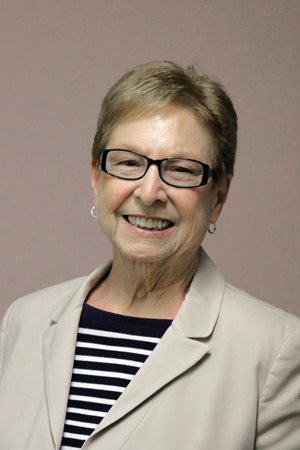 TOPEKA—Anne McDonald, whose 37-year career has spanned the legal system, is this year's recipient of the Justice Kay McFarland Award presented by the Women Attorneys Association of Topeka.
TOPEKA—Anne McDonald, whose 37-year career has spanned the legal system, is this year's recipient of the Justice Kay McFarland Award presented by the Women Attorneys Association of Topeka.
McDonald will be presented the award at the organization's Just Desserts fundraiser on June 1.
McDonald is executive director of the Kansas Lawyers Assistance Program (KALAP), created by the Kansas Supreme Court in 2001 to help lawyers seek treatment for physical or mental illness, substance abuse, or emotional distress.
In nominating McDonald for the award, Kansas Court of Appeals Chief Judge Karen Arnold-Burger cited her professionalism and expertise as head of KALAP.
"With her at the helm, the Kansas Lawyers Assistance Program has helped countless attorneys avoid disciplinary problems as a result of addiction, depression, or mental health issues," Judge Arnold-Burger wrote. "Her kindness and knowledge of mental health and addiction issues have gently encouraged many to get help and salvage their careers. Many, many lawyers owe their health and their careers to Anne McDonald."
McDonald said she was honored to receive the award but said it was a reflection of the program's success.
"I think it speaks to a growing accepting of KALAP; it isn't about me," she said.
Kansas Supreme Court Justice Eric Rosen, who is the court's liaison to KALAP, said McDonald has worked hard to broaden the scope of the organization.
"Since taking over as our executive director in 2009, Anne's vision has led to an expansion of KALAP's services. We have broadened our understanding of 'assistance' to include interventions designed to address the multitude of needs and stressors encountered by lawyers and law students," he said.
"Through Anne's tireless and dedicated leadership, KALAP has become nationally recognized for its forward and progressive programs. Perhaps even more importantly, Anne's work has been a beacon of hope—she's never backed away from meeting head-on the needs of those in crisis. Her compassion and support provides the guiding light to services for anyone in need," Justice Rosen added.
KALAP works in the background to help lawyers, whose profession is among the most stressful, McDonald said. She cites statistics that show attorneys are two to three times more likely to exhibit anxiety, suffer from depression, or become addicted to alcohol or drugs than the general population.
Yet they also see greater barriers to treatment, such as negative publicity and the fear of losing their license to practice law, she said.
KALAP's work is 100 percent confidential and 100 percent voluntary, McDonald said.
She said KALAP's initial focus was helping attorneys deal with alcohol abuse, but now her group works on any problem that could affect an attorney's practice in the future. A lawyer seeking help can be paired with a volunteer attorney for peer counseling, directed to a treatment center or medical professional, or pointed to KALAP's Resiliency Support Group, which offers weekly sessions run by a psychologist who also is a lawyer. Sessions are offered in Overland Park, Topeka, and Lawrence, with the Lawrence meetings also available to lawyers living a distance away via Skype.
"We stress education and prevention, but then if you need help, it's rehabilitation and remediation," McDonald said.
More information is available at http://www.kalap.com/.
The Women Attorneys Association of Topeka's award is named for the late Kay McFarland, the first female chief justice of the Kansas Supreme Court.
McFarland, who died at age 80 in 2015, was the first recipient of the award in 2006. She was the first woman elected a judge in Shawnee County, the first woman to be a district judge in Kansas, and the only woman to serve as chief justice of the Supreme Court.
Justice Rosen said, "Having served with Chief Justice McFarland, I am cognizant of the professional excellence required of the recipient of this prestigious award. Anne McDonald is most worthy of this recognition and honor."
The award will be presented to McDonald during Just Desserts, the group's annual fundraiser for the Washburn Women's Alliance, which provides scholarships for single parents enrolled at Washburn University.
Nicole Revenaugh, chair of Just Desserts, said WAAT's board reviews nominations for the McFarland Award and selects the most appropriate woman to receive it.
McDonald did not initially choose law as a career.
"I was in my 30s when I went to law school," she said, inspired to do so after working in the late 1970s as executive secretary to Kansas City, Kan., Mayor Jack Reardon.
She graduated in 1961 from Bishop Ward High School in Kansas City, Kan., and joined the Sisters of Charity of Leavenworth. She studied at St. Mary College, which the sisters sponsor, and taught elementary school for four years. After leaving the religious community, McDonald worked as a payroll clerk before being hired by Mayor Reardon.
She earned a law degree from the University of Kansas in 1982, then practiced law for three years before being hired as a court trustee for the 29th Judicial District in Kansas City, Kan. She retired from that job in 2006.
McDonald's connection to KALAP began in the 1980s, when she was active in the Kansas Bar Association's Committee on Impaired Lawyers. That led to her appointment to the KALAP board when it was formed in 2001.
She joined the KALAP staff in 2009, initially as interim director.
"I wasn't sure I wanted the job; I liked retirement," she said. "But I've been a good fit for the job, and the job has been a good fit for me.
"We've had the support of the Supreme Court and the KBA and a great staff. I could hardly ask for more. It's a great way to close out a career," she said.
McDonald lives in Kansas City, Kan., with her husband, Robert Wilshire. She has two stepsons.